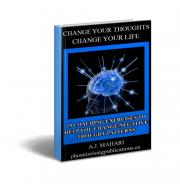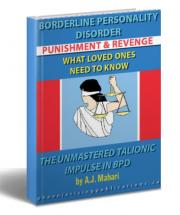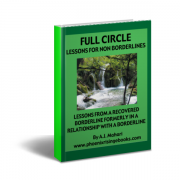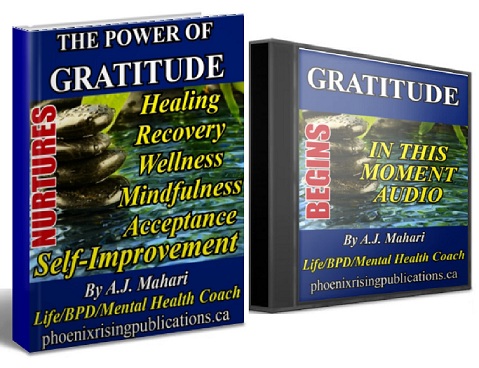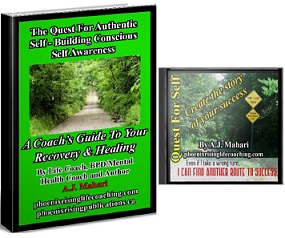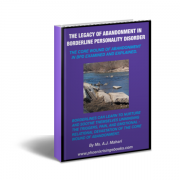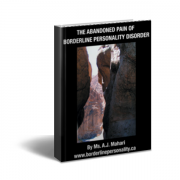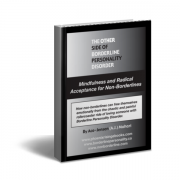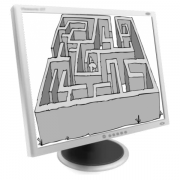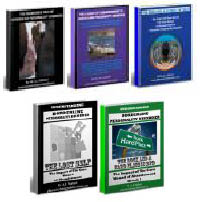Rage is a hallmark of Borderline Personality Disorder. It has meaning and purpose. Rage is the vehicle of and expression of both primal pain and the need to protect from feeling that primal pain.
![]()
Outward Rage--The pain within
Click Here To Purchase A.J. Mahari's Core Wound of Abandonment Ebooks packaged together, with or without audio programs.
- Purchase all 3 of ebooks for NON BORDERLINES or 3 Non Borderline Ebooks packaged together with audio.
- Non Borderlines - You can purchase 6 ebooks packaged together without audio or 6 ebooks bundled together with 2 audio programs 6 ebooks packaged together with 2 audio programs
- Those with BPD and/or Non Borderlines can purchase A.J. Mahari's 3 "Core Wound of Abandonment" series ebooks or Mahari's 3 "Core Wound of Abandonment" series ebooks with From False Self To Authentic Self In BPD - The Inner Chid Audio Program
If you have Borderline Personality Disorder (BPD) you've likely experienced rage. For a great many with BPD this rage is an outward rage. It is taken out and or directed at those who get closest to you. Although it is difficult (to varying degrees) for most with BPD to get close (and stay close) to others the degree to which the borderline feels close is the issue. Whether or not a relationship is close matters not. If a borderline perceives you as close, often the duality then becomes the push-pull of wanting to feel safe with the closeness and feeling an ever-present (or rather cyclical) acceptance of "other" and of the relationship coinciding with bouts of rage. (feeling unsafe with anyone close, feeling exposed if known, feeling too damaged to ever be understood, valued and respected.)
Where does the rage come from? (I've read so many ask, on an email list I run for borderlines) Many with BPD are just as surprised and shocked at their raging behaviour as are their friends, partners, and relatives.
In my experience, in healing from BPD....I found that my rage at the world, at those around me, at anyone who dared to care or tried to get or stay close was born out of my own pain. Yes a profoundly deep pain. A pain that had its roots in "original wounds" (John Bradshaw). An intra-psychic pain that only I could reach, undo, work through and heal. (In therapy)
What happened many times for me in trying to be close to others was an immediate and deep-seated projection/transference onto them by me in which they would become a parent figure and then (most of this was subconscious at the time, in the past) they would represent to me all of my past loss. So, in being close I would be waiting for the rejection and abandonment and neglect and abuse--all of which I received as a young child.
- Purchase all 3 of ebooks for NON BORDERLINES or 3 Non Borderline Ebooks packaged together with audio.
- Non Borderlines - You can purchase 6 ebooks packaged together without audio or 6 ebooks bundled together with 2 audio programs 6 ebooks packaged together with 2 audio programs
- Those with BPD and/or Non Borderlines can purchase A.J. Mahari's 3 "Core Wound of Abandonment" series ebooks or Mahari's 3 "Core Wound of Abandonment" series ebooks with From False Self To Authentic Self In BPD - The Inner Chid Audio Program
It is this fundamental dissociative experience that leaves both the borderline and those who care about them in the line of fire. The waiting for the abuse or rejection/abandonment to replay itself is a testament to the existence of a BPD reality in which the larger picture or reality is not consistently known, perceived, held or understood. If it were possible to think beyond the cognitive distortions (which it is through therapy) at the time, the borderline would not be so convinced that a person close to them, in the here and now, was at any moment, going to repeat the rejection/abandonment (etc) of the past. If you have BPD you live in a world within a world.
This in and of itself can be the root of much rage and pain as well. Borderlines grow up learning to think "distorted thoughts". Without re-training your way of thinking, and feeling your actions, namely raging, and acting out continue to replay themselves. The actions of a child continue to play out, no matter how old you are because until those thought patterns are changed you are thinking like you did as a child.
When BPD rage occurs it can be lightening fast and to anyone on the "outside" make little to no sense at all for what is happening in that time and place. For the borderline however, they are re-experiencing (due to triggers) their past. This is the major reason why most borderlines are also extremely controlling of those around them and their environment. It is an effort to control themselves. Since they do not have any clear individuated boundaries: they don't know where they end and others begin, the control that they try to exert far exceeds what the average person would need to do in any given situation. The average person, with boundaries, knowing the difference between self and other needs only to control themselves.
BPD rage, appears to be about control, on the surface. It isn't really. If there is anything that is trying to be controlled through this rage it is that the borderline is trying so desperately to not feel "old" pain (or original pain) on top of what is usually a fair amount of pain in the here and now as well. Though they may often be dissociated from both the present and the past's pain. It is the reality of not having a sense of who one is that also enables so much of the "continuity" of time to be endlessly disrupted in the mind of a borderline. Rage is born of lostness so deep that one feels perpetually like a helpless child. (again no matter what actual age they may be)
At the root of the rage is the anger. At the root of the anger is the hurt and the pain, the devastation at what they had to endure in the past. Most borderlines (up to some point in therapy and healing) remain very unaware of this.
For me, working this through has changed my life. It has always seemed very cruel to me though that in order to work through much of the borderline rage I had to endure not only the rage, and the source of that rage inside of myself but also the anger, hurt, and fear that not only the rage produced in me, but also that I already felt anyway. There is also a tremendous amount of shame connected to any behaviour that is rage-related or that is generated by the rages.
When a borderline rages they hurt.
They hurt more than words can say. They hurt more than they often know. This does not justify the rage in the here and now, nor does it excuse the abuse. If you are borderline you must come to know that the way through the rage to the other side of it all is to feel your feelings in an appropriate way that allows you to grieve them. It is only through grieving them, through journaling, crying, talking about them that you can work them through enough to let them go. This, coupled with cognitive re-training is the way out of what seems like an endless cycle of rage that you, as a borderline may well feel happens to you.
It doesn't "happen" to you --NOW-- in the here and now. NO. It happened to you years ago. You have been recapitulating it from deep within your subconscious because you have not worked it out. This is tantamount to choosing it. You play a central and very active role in your rage it does not just happen. Furthermore, NOBODY can MAKE YOU DO IT....you are responsible for it.
BPD rage makes victims of us all. It victimizes those who care about the person with BPD often to the point where they have to withdraw or pull away to maintain their own sanity and health. It also re-victimizes the borderline. Nobody wins. Nobody benefits.
The here and now is lost to--then. It is abusive to rage at anyone for any reason. It is appropriate to express how you feel when you are being personably responsible for those feelings.
Once we reach the age of adulthood there is no legitimate reason to stay in the throes of our childhoods. BPD, as a personality disorder very much has this influence. The thing that can be so difficult to grasp and that produces a significant amount of grief when grasped is that we indeed make the choices that we make. Borderlines were subjected to something as children in the way they were parented or the environment in which they lived that set things in motion. However, so much of BPD though it is an understandable response to trauma remains a "coping" choice.
BPD is a maze of defense mechanisms designed to ensure that we never have to endure the annihilating pain that so affected us originally when we were young. The tragedy is that these choices, when exercised beyond the initial stimuli that caused these reactions are dysfunctional and are mal-adaptive ways of coping. The tragedy is that so much more loss is amassed before one can begin to sift through the damage, the hurt and the pain and the grief that lays so deeply within the hole in one's soul....if you are raging, think about this; "On the other side of rage, is loss" (quoted source not currently known)
Rage seeks to protect.
Within the protection that it offers it is doing (often) irreparable further damage to your relationships or chances to build relationships. Your efforts to protect yourself through rage are only further hurting you. Your efforts to avoid loss and feeling the losses that you've already suffered are only chalking up more losses for you to avoid feeling. Loss hurts. Loss must be felt and dealt with. Loss and the pain of loss is within you. It is yours. It is not bigger than you. You can feel it, now, and survive it now. If you don't stop raging you will not stop losing.
You CAN choose to stop raging and start feeling. I won't kid you, IT HURTS. It hurts a great deal but the worth in healing all of this pain and grief, hurt and loss is that you will not have to continue to rage. You can learn to deal with loss, to hold those feelings, to be safe with those feelings. Being hurt and or feeling our hurt in the here and now does not have to mirror our childhood.
Outwardly you choose to rage to mask the pain that is within you. That pain, that is within you, IS YOURS. It does not belong to anyone else. No one else deserves to have you throw your pain at them in rage, ever again.....
Rage is a selfish and immature choice. It is abusive. It is shaming. It is dissociative and or avoidant behaviour. The decision, the choice, is yours. Will you continue to rage, and to throw your responsibility for your pain onto others? Or will you decide enough is enough and that you want to heal enough to do the work that can set you and those you love free from the rages of BPD that leave others feeling that knowing you is like being held in captivity.
© Ms. A.J. Mahari - May 2, 1999
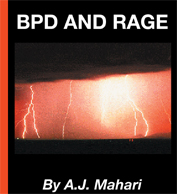 BORDERLINE PERSONALITY DISORDER and
RAGE - Storms in the absence of self© A.J. Mahari is an ebook that consists of seven
chapters of detailed examination, understanding, and explanation of Borderline Rage from the
insightful perspective of one who has been there. A.J. provides a roadmap of hope and practical
steps to help the borderline stop the rage and/or stop the self harm and heal the wounds, and
transform his/her life. Those diagnosed with BPD, in a relationship (friend, family member, significant other,
(ex-partner) with someone with BPD, as well as any professional treating someone with BPD will benefit
from the insight A.J. Mahari shares based upon her own recovery from BPD.
BORDERLINE PERSONALITY DISORDER and
RAGE - Storms in the absence of self© A.J. Mahari is an ebook that consists of seven
chapters of detailed examination, understanding, and explanation of Borderline Rage from the
insightful perspective of one who has been there. A.J. provides a roadmap of hope and practical
steps to help the borderline stop the rage and/or stop the self harm and heal the wounds, and
transform his/her life. Those diagnosed with BPD, in a relationship (friend, family member, significant other,
(ex-partner) with someone with BPD, as well as any professional treating someone with BPD will benefit
from the insight A.J. Mahari shares based upon her own recovery from BPD.
Please Click HERE to Purchase A.J.'s ebook Borderline Personality Disorder and Rage - Storms in the Absence of Self $10.99
- Purchase all 3 of ebooks for NON BORDERLINES or 3 Non Borderline Ebooks packaged together with audio.
- Non Borderlines - You can purchase 6 ebooks packaged together without audio or 6 ebooks bundled together with 2 audio programs 6 ebooks packaged together with 2 audio programs
- Those with BPD and/or Non Borderlines can purchase A.J. Mahari's 3 "Core Wound of Abandonment" series ebooks or Mahari's 3 "Core Wound of Abandonment" series ebooks with From False Self To Authentic Self In BPD - The Inner Chid Audio Program



